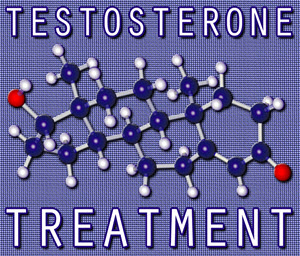Introduction
Testosterone, often recognized for its role in male sexual development and function, also plays a pivotal role in the maintenance of bone health. As American males age, understanding the link between testosterone levels and bone density becomes increasingly important for preventing conditions such as osteoporosis. This article delves into the scientific relationship between testosterone and bone density, offering insights into how men can maintain skeletal health throughout their lives.
The Science Behind Testosterone and Bone Health
Testosterone is not only a key hormone in the development of male characteristics but also an essential component in the regulation of bone metabolism. It directly influences bone density by stimulating the activity of osteoblasts, the cells responsible for bone formation. Additionally, testosterone helps to inhibit the activity of osteoclasts, cells that break down bone tissue. This dual action contributes to the maintenance and even the increase of bone mass, which is crucial for preventing bone-related diseases.
Testosterone Levels and Age-Related Bone Loss
As men age, a natural decline in testosterone levels occurs, which can lead to a reduction in bone density. This age-related decrease in testosterone is a significant factor in the development of osteoporosis in older men. Studies have shown that men with lower testosterone levels are at a higher risk of experiencing bone fractures and developing osteoporosis. Therefore, monitoring and managing testosterone levels as men age is critical for maintaining bone health.
The Impact of Low Testosterone on Bone Density
Low testosterone, or hypogonadism, can significantly impact bone density. Men with hypogonadism often exhibit lower bone mineral density and are at an increased risk for fractures. The condition can be congenital or acquired later in life due to various factors such as obesity, chronic diseases, or certain medications. It is essential for American males to be aware of the symptoms of low testosterone, such as decreased libido, fatigue, and mood changes, and to seek medical advice if they suspect they may be affected.
Strategies for Maintaining Bone Health Through Testosterone Management
Maintaining optimal testosterone levels is a key strategy for preserving bone density. For men with diagnosed hypogonadism, testosterone replacement therapy (TRT) can be an effective treatment to improve bone health. TRT has been shown to increase bone mineral density and reduce the risk of fractures in men with low testosterone levels. However, it is crucial that TRT is administered under the supervision of a healthcare professional to monitor its effects and adjust the treatment as necessary.
In addition to medical interventions, lifestyle factors play a significant role in maintaining bone health. Regular exercise, particularly weight-bearing and resistance training, can help to stimulate bone formation and counteract the effects of declining testosterone levels. A diet rich in calcium and vitamin D is also essential for supporting bone health, as these nutrients are critical for bone mineralization.
Conclusion
The link between testosterone and bone density is a critical consideration for American males, particularly as they age. Understanding the role of testosterone in bone metabolism and the impact of its decline can empower men to take proactive steps to maintain their skeletal health. Through a combination of medical management, lifestyle modifications, and nutritional support, men can work to preserve their bone density and reduce the risk of osteoporosis and fractures. As research continues to uncover the intricacies of testosterone's influence on bone health, staying informed and engaged with healthcare providers will be key to ensuring a strong and healthy skeletal system throughout life.
Contact Us Today For A Free Consultation

- Genetics and Testosterone: Interplay, Influences, and Personalized Health Strategies [Last Updated On: February 18th, 2025] [Originally Added On: February 18th, 2025]
- Stoking Man’s Mettle: An In-Depth Look at Testosterone [Last Updated On: February 25th, 2025] [Originally Added On: February 25th, 2025]
- Unraveling the Testosterone Enigma: Navigating the Masculine Hormone's Impact on Life [Last Updated On: February 26th, 2025] [Originally Added On: February 26th, 2025]
- Unraveling Spectrum: Transitioning Through the Testosterone Timeline [Last Updated On: February 27th, 2025] [Originally Added On: February 27th, 2025]
- Unveiling the Realm Beyond Muscles: Illuminating the Comprehensive Merits of Optimum Testosterone Levels [Last Updated On: February 28th, 2025] [Originally Added On: February 28th, 2025]
- Unraveling the Testosterone Narrative: Distinguishing Truths from Fallacies [Last Updated On: February 28th, 2025] [Originally Added On: February 28th, 2025]
- Unlocking Vitality and Vigor: Unfolding the Secrets of Testosterone [Last Updated On: March 1st, 2025] [Originally Added On: March 1st, 2025]
- Empowering the Androgenic Alchemy: Natural Diet Strategies to Amplify Testosterone Secretion [Last Updated On: March 2nd, 2025] [Originally Added On: March 2nd, 2025]
- Optimizing Testosterone Levels Through Exercise: Mechanisms, Effective Workouts, and Age-Related Impacts [Last Updated On: March 3rd, 2025] [Originally Added On: March 3rd, 2025]
- Impact of Testosterone on Mental Health and Cognitive Functions [Last Updated On: March 4th, 2025] [Originally Added On: March 4th, 2025]
- Understanding Testosterone's Role in Male Health and Development Across Lifespan [Last Updated On: March 5th, 2025] [Originally Added On: March 5th, 2025]
- Understanding Testosterone's Role in Male Health and Development Across the Lifespan [Last Updated On: March 6th, 2025] [Originally Added On: March 6th, 2025]
- Optimizing Testosterone Levels Naturally: Diet, Exercise, Sleep, Stress, and Lifestyle Strategies [Last Updated On: March 7th, 2025] [Originally Added On: March 7th, 2025]
- Advancements in Testosterone Therapy: Enhancing Men's Health and Quality of Life [Last Updated On: March 8th, 2025] [Originally Added On: March 8th, 2025]
- Optimizing Male Health: Managing Testosterone Decline for Vitality and Well-Being [Last Updated On: March 9th, 2025] [Originally Added On: March 9th, 2025]
- Testosterone's Vital Role in Women's Health: Insights for American Males [Last Updated On: March 11th, 2025] [Originally Added On: March 11th, 2025]
- Unlocking the Potential: The Future of Hormonal Health Through Testosterone Research [Last Updated On: March 12th, 2025] [Originally Added On: March 12th, 2025]
- The Nocturnal Boost: How Sleep Fuels Testosterone Production in American Men [Last Updated On: March 12th, 2025] [Originally Added On: March 12th, 2025]
- Navigating Hormonal Harmony: The Interplay of Stress, Cortisol, and Testosterone in American Men [Last Updated On: March 13th, 2025] [Originally Added On: March 13th, 2025]
- Unleashing Potential: The Role of Testosterone in Athletic Performance Among American Males [Last Updated On: March 15th, 2025] [Originally Added On: March 15th, 2025]
- Understanding and Managing Low Testosterone in American Men: Symptoms, Causes, and Treatments [Last Updated On: March 19th, 2025] [Originally Added On: March 19th, 2025]
- Testosterone Enhancement: Supplements, Natural Remedies, and Medical Interventions for American Males [Last Updated On: March 19th, 2025] [Originally Added On: March 19th, 2025]
- Testosterone's Impact on Cardiovascular Health in American Males: A Comprehensive Overview [Last Updated On: March 19th, 2025] [Originally Added On: March 19th, 2025]
- Testosterone's Role in Enhancing Workplace Productivity and Drive for American Males [Last Updated On: March 19th, 2025] [Originally Added On: March 19th, 2025]
- Environmental Toxins' Impact on Male Testosterone Levels and Health [Last Updated On: March 19th, 2025] [Originally Added On: March 19th, 2025]
- Testosterone's Impact on Mood, Memory, and Motivation in American Males [Last Updated On: March 19th, 2025] [Originally Added On: March 19th, 2025]
- Testosterone's Crucial Role in Immune Health for American Males [Last Updated On: March 20th, 2025] [Originally Added On: March 20th, 2025]
- Testosterone Revolution: Redefining Masculinity and Enhancing Men's Health in America [Last Updated On: March 21st, 2025] [Originally Added On: March 21st, 2025]
- Testosterone's Role in Male Libido: Understanding and Enhancing Sexual Vitality [Last Updated On: March 21st, 2025] [Originally Added On: March 21st, 2025]
- Testosterone's Impact on Metabolism and Fat Burning in American Males [Last Updated On: March 21st, 2025] [Originally Added On: March 21st, 2025]
- Testosterone's Role in Muscle Recovery: Mechanisms and Optimization Strategies [Last Updated On: March 22nd, 2025] [Originally Added On: March 22nd, 2025]
- Resistance Training Boosts Testosterone: Benefits and Protocols for American Males [Last Updated On: March 22nd, 2025] [Originally Added On: March 22nd, 2025]
- Testosterone's Impact on Ambition and Competition in American Males [Last Updated On: March 23rd, 2025] [Originally Added On: March 23rd, 2025]
- Navigating Testosterone Concerns: Preparation, Communication, and Treatment Options with Your Doctor [Last Updated On: March 23rd, 2025] [Originally Added On: March 23rd, 2025]
- Testosterone and Sleep: Enhancing Health in American Males Through Better Sleep [Last Updated On: March 23rd, 2025] [Originally Added On: March 23rd, 2025]
- Urban vs. Rural Living: Impacts on Testosterone Levels in American Males [Last Updated On: March 24th, 2025] [Originally Added On: March 24th, 2025]
- Outdoor Activities Boost Testosterone: Nature's Impact on Men's Health [Last Updated On: March 24th, 2025] [Originally Added On: March 24th, 2025]
- Key Nutrients Boost Testosterone: Vitamin D, Zinc, Magnesium, B6 for American Males [Last Updated On: March 24th, 2025] [Originally Added On: March 24th, 2025]
- Meditation Boosts Testosterone: A Holistic Approach for American Males' Health [Last Updated On: March 24th, 2025] [Originally Added On: March 24th, 2025]
- Testosterone's Impact on Cognitive Function in American Males Across Age Groups [Last Updated On: March 24th, 2025] [Originally Added On: March 24th, 2025]
- Optimizing Testosterone: The Impact of Rest and Nutrition on American Males' Health [Last Updated On: March 24th, 2025] [Originally Added On: March 24th, 2025]
- Optimizing Testosterone: Nutrition, Exercise, Sleep, and Stress Management for American Men [Last Updated On: March 25th, 2025] [Originally Added On: March 25th, 2025]
- Boosting Testosterone: American Men's Guide to Positivity and Mental Health [Last Updated On: March 25th, 2025] [Originally Added On: March 25th, 2025]
- Hormonal Harmony: Testosterone's Interplay and Balance Strategies for American Males [Last Updated On: March 25th, 2025] [Originally Added On: March 25th, 2025]
- Testosterone Levels in American Men: Factors, Impacts, and Optimization Strategies [Last Updated On: March 25th, 2025] [Originally Added On: March 25th, 2025]
- Low Testosterone's Economic Impact: Healthcare Costs, Productivity, and Social Well-being in the U.S. [Last Updated On: March 25th, 2025] [Originally Added On: March 25th, 2025]
- Testosterone Tracking: Apps and Wearables Revolutionize Men's Health Monitoring [Last Updated On: March 25th, 2025] [Originally Added On: March 25th, 2025]
- Testosterone's Multifaceted Impact on American Men's Mental Health [Last Updated On: March 25th, 2025] [Originally Added On: March 25th, 2025]
- Testosterone's Vital Role in Cardiovascular Health for American Males [Last Updated On: March 25th, 2025] [Originally Added On: March 25th, 2025]
- Understanding Andropause: Symptoms, Testosterone's Role, and Management Strategies [Last Updated On: March 25th, 2025] [Originally Added On: March 25th, 2025]
- Social Dynamics and Testosterone Levels in American Males: A Comprehensive Analysis [Last Updated On: March 25th, 2025] [Originally Added On: March 25th, 2025]
- Boost Testosterone with Resistance Bands: A Home Workout Guide for Men [Last Updated On: March 26th, 2025] [Originally Added On: March 26th, 2025]
- Modern Diets and Testosterone: Insights for American Men's Health [Last Updated On: March 26th, 2025] [Originally Added On: March 26th, 2025]
- Testosterone's Influence on Risk-Taking in American Males: Neurobiological Insights [Last Updated On: March 26th, 2025] [Originally Added On: March 26th, 2025]
- Music and Art: Natural Boosters for Testosterone in American Males [Last Updated On: March 26th, 2025] [Originally Added On: March 26th, 2025]
- Revolutionizing Men's Health: Advances in Testosterone Optimization Technologies [Last Updated On: March 27th, 2025] [Originally Added On: March 27th, 2025]
- Testosterone's Role in Enhancing Mental Resilience Among American Males [Last Updated On: March 27th, 2025] [Originally Added On: March 27th, 2025]
- Testosterone Replacement Therapy: Benefits, Risks, and Realities for American Males [Last Updated On: March 27th, 2025] [Originally Added On: March 27th, 2025]
- Testosterone Management in American Males with Chronic Diseases: Insights and Strategies [Last Updated On: March 27th, 2025] [Originally Added On: March 27th, 2025]
- Intermittent Fasting: Boosting Testosterone and Health in American Males [Last Updated On: March 27th, 2025] [Originally Added On: March 27th, 2025]
- Testosterone and Athletic Performance: Myths, Facts, and Future Research for American Males [Last Updated On: March 27th, 2025] [Originally Added On: March 27th, 2025]
- Testosterone's Impact on Body Image and Self-Esteem in American Males [Last Updated On: March 27th, 2025] [Originally Added On: March 27th, 2025]
- Personalized Medicine Revolutionizes Testosterone Therapy for American Males [Last Updated On: March 27th, 2025] [Originally Added On: March 27th, 2025]
- Testosterone's Role in Longevity: Optimization and Therapy Insights [Last Updated On: March 28th, 2025] [Originally Added On: March 28th, 2025]
- Testosterone Health for American Males: Balancing Work and Wellness Strategies [Last Updated On: March 28th, 2025] [Originally Added On: March 28th, 2025]
- Declining Testosterone Levels in American Males: Trends, Causes, and Health Strategies [Last Updated On: March 28th, 2025] [Originally Added On: March 28th, 2025]
- Testosterone's Role in American Male Health: Understanding, Testing, and Treatment [Last Updated On: March 28th, 2025] [Originally Added On: March 28th, 2025]
- Testosterone Research: From Lab Discoveries to Clinical Impacts on American Men's Health [Last Updated On: March 29th, 2025] [Originally Added On: March 29th, 2025]
- Testosterone's Impact on Immune Health in American Men: Insights and Management Strategies [Last Updated On: March 30th, 2025] [Originally Added On: March 30th, 2025]
- Testosterone's Impact on Skin, Hair Health: A Guide for American Men [Last Updated On: March 30th, 2025] [Originally Added On: March 30th, 2025]
- Gut Health and Testosterone: Optimizing Hormonal Balance in American Males [Last Updated On: March 30th, 2025] [Originally Added On: March 30th, 2025]
- Body Composition's Impact on Testosterone Levels in American Males [Last Updated On: April 1st, 2025] [Originally Added On: April 1st, 2025]
- Testosterone's Crucial Role in Male Sexual Health and Well-being for American Men [Last Updated On: April 1st, 2025] [Originally Added On: April 1st, 2025]
- Alcohol and Smoking: Impact on Testosterone Levels in American Males [Last Updated On: April 2nd, 2025] [Originally Added On: April 2nd, 2025]
- Testosterone's Evolutionary Impact on Social Dominance in American Males [Last Updated On: April 6th, 2025] [Originally Added On: April 6th, 2025]
- Acupuncture: A Natural Approach to Balancing Testosterone in American Males [Last Updated On: April 7th, 2025] [Originally Added On: April 7th, 2025]
- Effective Strategies for American Men to Boost Testosterone Naturally and Safely [Last Updated On: April 9th, 2025] [Originally Added On: April 9th, 2025]
- Boost Testosterone Naturally: Mindful Living Practices for American Men [Last Updated On: April 9th, 2025] [Originally Added On: April 9th, 2025]
- HIIT Boosts Testosterone: Benefits and Practical Guide for American Males [Last Updated On: April 9th, 2025] [Originally Added On: April 9th, 2025]
- Seasonal Testosterone Fluctuations: Impact and Management Strategies for American Males [Last Updated On: April 10th, 2025] [Originally Added On: April 10th, 2025]
Word Count: 571





















